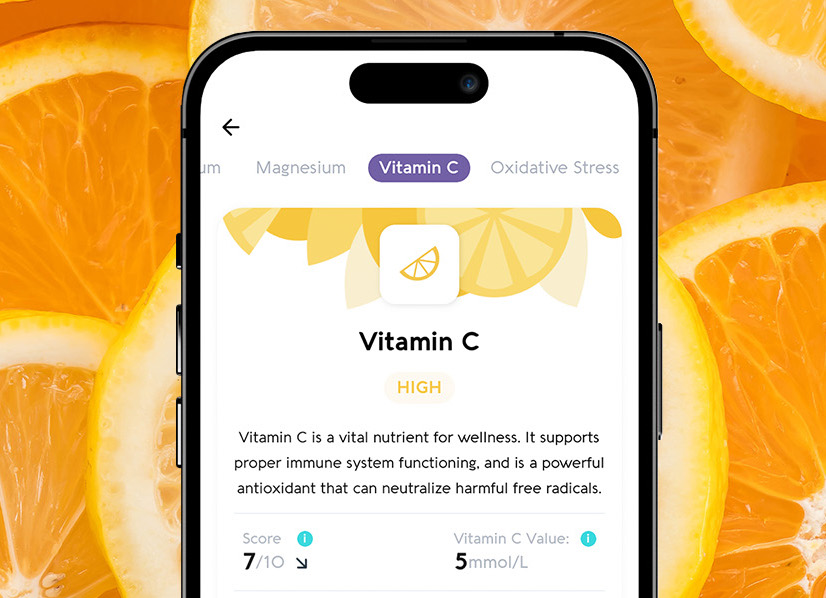Vitamin C
Vitamin C, also known as ascorbic acid, is an essential nutrient that plays a role in maintaining good health. Vitamin C also plays various roles from supporting the immune system to promoting healthy skin and hair. Whether you're looking to better understand its necessity in your daily routine or seeking tips on maximizing its absorption, this guide covers everything you need to know about vitamin C!
What are the Benefits of Vitamin C?
Vitamin C, also known as ascorbic acid, is a crucial water-soluble vitamin that is essential for various bodily functions. There are many benefits of vitamin C such as:
- Powerful Antioxidant: Vitamin C serves as an antioxidant, which aids in neutralizing harmful free radicals within the body. This action helps to decrease oxidative stress and inflammation, thus ultimately promoting better overall wellness.
- Immune System Support: This vital nutrient plays a role in bolstering the immune system, aiding in the reinforcement of the body's protection against infections and diseases.
- Collagen Production: Collagen synthesis, a protein responsible for maintaining the elasticity and structure of the skin, requires vitamin C. This nutrient is crucial in achieving healthier and more youthful-looking skin.
- Wound Healing: Vitamin C is essential for forming connective tissue and improving the body's ability to efficiently heal wounds, cuts, and bruises.
- Iron Absorption: This helps the body better absorb non-heme iron, which is found in plant-based foods. It can prevent iron deficiency anemia and improve overall iron utilization in the body.
- Cardiovascular Health: There is a connection between Vitamin C and better heart health as it can reduce the risk of cardiovascular disease.
- Eye Health: Vitamin C, as an antioxidant, provides protection to the eyes from oxidative damage, thus mitigating the chances of age-related macular degeneration (AMD) and cataracts.
How Much Vitamin C is Recommended On A Daily Basis?
So, how much vitamin C per day? The Institute of Medicine (IOM) has established a set of reference values for various nutritional consumption levels, including vitamin C intake.
The Recommended Dietary Allowance (RDA) is a set of standards that takes into account average daily nutritional consumption from meals and supplements.
RDA standards for various gender and age groups should fulfill 97–98% of healthy people's nutritional requirements.
The RDAs for vitamin C are as follows:
|
Life stage |
RDA |
|
Kids (1–3 years) |
15 mg |
|
Kids (4–8 years) |
25 mg |
|
Adolescents (9–13 years) |
45 mg |
|
Teens (14–18 years) |
65–75 mg |
|
Adult women (aged 19 and older) |
75 mg |
|
Adult men (aged 19 and older) |
90 mg |
|
Pregnant women (aged 19 and older) |
85 mg |
|
Breastfeeding women (aged 19 and older) |
120 mg |
What Foods Have Vitamin C?
There are plenty of tasty options in nature as fruit and vegetables help you meet your daily vitamin C needs and the most common are:
- Citrus Fruits (e.g., oranges, lemons, grapefruits): Citrus fruits are well-known for being excellent sources of vitamin C. They are not only delicious, but also packed with this essential nutrient, helping to support your immune system.
- Strawberries: These juicy and vibrant berries are not only a sweet treat but also a great source of vitamin C, contributing to collagen production and offering antioxidant benefits.
- Kiwi: This small but mighty fruit is a vitamin C powerhouse, providing more vitamin C per gram than many other fruits. Enjoy kiwi for an extra boost to your immune system.
- Pineapple: Besides its tropical flavor, pineapple contains a healthy dose of vitamin C, supporting your body's defense against free radicals.
- Broccoli: This cruciferous vegetable is not only rich in fiber and nutrients but also an excellent source of vitamin C, boosting your overall health.
- Bell Peppers: Colorful and crunchy, bell peppers, especially the red ones, are loaded with vitamin C, contributing to providing antioxidant protection.
- Tomatoes: These versatile fruits (often used as vegetables) are rich in vitamin C and other beneficial compounds, supporting your immune system.
- Guava: Guava stands out as a fruit with one of the highest concentrations of vitamin C, offering immune support and potential anti-inflammatory benefits.
- Papaya: This tropical fruit is not only delicious but also a good source of vitamin C.
- Spinach: Among its many nutrients, spinach contains vitamin C, which supports immune function.
- Brussels sprouts: Brussels sprouts are rich in vitamin C due to their natural composition as a cruciferous vegetable. Regular consumption of these nutrient-packed vegetables can help individuals meet their daily vitamin C requirements, supporting immune function and overall health.
- Kale: This nutrient-packed leafy green boasts vitamin C content, contributing to your daily antioxidant needs.

How Much Vitamin C is Too Much?
It's difficult to overdose on vitamin C since it's water-soluble and your body excretes excess levels after a few hours of consumption. In fact, getting too much vitamin C from your diet alone is practically impossible. Any vitamin C ingested more than the required daily quantity is simply flushed out of the body in healthy persons.
To put that in perspective, you'd have to eat 29 oranges or 13 bell peppers before reaching the maximum limit of acceptable consumption. When individuals take supplements, however, the dangers of vitamin C overdose are increased, and in rare cases, it is possible to ingest too much of the vitamin.
Those with illnesses that raise the risk of iron overload or those who are prone to kidney stones, for example, should limit their vitamin C consumption.
When individuals consume massive amounts of vitamin C larger than 2,000 mg, negative consequences, including digestive discomfort and renal stones, seem to occur. If you decide to take a vitamin C supplement, be sure it contains no more than 100% of your daily requirements. That's 90 mg for males and 75 mg for women each day.
What Happens If You Take Too Much Vitamin C?
Although vitamin C is known to have numerous health benefits, consuming too much of it can have negative effects. Taking large amounts of vitamin C supplements can cause digestive problems such as diarrhea, nausea, and abdominal cramps. Additionally, excessive amounts of vitamin C can hinder the absorption of other important nutrients like copper and zinc, which can lead to long-term deficiencies.
Vitamin C Is A Water-Soluble that Can Not Be Stored in The Body
Vitamin C is a water-soluble vitamin, meaning it dissolves when it comes in contact with water. Water-soluble vitamins, unlike fat-soluble vitamins, are not stored in the body. Instead, the vitamin C you eat is carried to your tissues via your bodily fluids, and any excess is eliminated in urine. Thus, you don’t need too much vitamin C (more than the body needs).
On the other hand, your body can neither retain, nor create vitamin C on its own. Thus, it is essential to consume vitamin C-rich foods on a regular basis. Taking too much vitamin C through supplements, on the other hand, might cause side effects including digestive upset and kidney stones.
If you take higher-than-normal dosages of this vitamin, it may begin to build in your body, possibly causing overdose symptoms. It's crucial to remember that most individuals don't need vitamin C pills since they may easily obtain enough from fresh meals, particularly fruits and vegetables.
Too Much Vitamin C Might Cause Stomach Problems:
Digestive upset is the most prevalent negative effect of increased vitamin C consumption. In general, these negative effects are caused by taking too many vitamin C supplements rather than consuming meals containing the vitamin.
If you take more than 2,000 mg at once, you're more likely to have stomach problems. As a result, a daily tolerated upper limit (TUL) of 2,000 mg has been set. Diarrhea and nausea are the most common digestive effects of too much vitamin C. If you're having digestive issues as a result of too much vitamin C, just reduce your supplement dosage or stop taking vitamin C for a while.
High-Dose Supplementation May Cause Kidney Stones
Too much vitamin C changes oxalate extraction , a waste product in the body. Oxalate is usually excreted in the urine. However, oxalate may bind to minerals and form crystals, which in some cases, can contribute to the production of kidney stones.
Too much vitamin C in your diet might raise the quantity of oxalate in your urine, increasing your chances of getting kidney stones, especially in individuals with renal disorders.
It's important to follow the suggested daily amount of vitamin C and seek advice from a medical expert before drastically increasing your intake. This will help prevent any potential adverse effects on your well-being.
What is Vitamin C Deficiency?
Vitamin C deficiency is rare in developed countries, but certain populations may be at a higher risk. People with limited access to fresh fruits and vegetables or those with malabsorption conditions, such as Crohn's disease or cystic fibrosis, may be at a higher risk of deficiency. Smokers also have a higher requirement of vitamin C as smoking depletes the body's stores of vitamin C.
To ensure that you are getting enough Vitamin C, you should aim to eat a diet that is rich in fruits and vegetables. Good sources of Vitamin C include oranges, lemons, limes, strawberries, kiwi fruit, papaya, bell peppers, and spinach. You can also take Vitamin C supplements, but it is always recommended to consult with a healthcare professional before taking any supplements.

What are the Symptoms of Vitamin C Deficiency?
There are several signs and symptoms that may indicate a deficiency in Vitamin C. These include:
Fatigue: Vitamin C is essential for the production of energy in the body, so a deficiency can lead to feelings of fatigue and weakness.
Bruising easily: Vitamin C is important for the production of collagen, which is essential for the health of blood vessels. A deficiency can lead to fragile blood vessels, which may cause bruising easily.
Dry and splitting hair: Vitamin C is important for the production of collagen, which is essential for the health of hair. A deficiency can lead to dry and splitting hair.
Swollen and bleeding gums: Vitamin C is important for the health of the gums. A deficiency can lead to swollen and bleeding gums.
Rough, dry, scaly skin: Vitamin C is important for the production of collagen, which is essential for the health of the skin. A deficiency can lead to rough, dry, and scaly skin.
Anemia: Vitamin C is important for the absorption of iron. A deficiency can lead to anemia, a condition in which there are not enough red blood cells to carry oxygen throughout the body.
Slow wound healing: Vitamin C is important for the production of collagen, which is essential for the healing of wounds. A deficiency can lead to slow wound healing.
Increased susceptibility to infections: Vitamin C is an antioxidant that helps to protect the body from damage caused by free radicals. A deficiency can lead to an increased susceptibility to infections.
It's important to note that these symptoms can be caused by other conditions and that it's always better to see a medical expert for personal causes.
What Conditions Does Vitamin C Deficiency Cause?
A lack of vitamin C can cause various health issues due to its many functions in the body. According to the National Health and Nutrition Examination Survey (NHANES) vitamin has impacts on various aspects of health and has an association with conditions.
Scurvy is the most well-known condition resulting from this deficiency in the long term, which can cause weakness, fatigue, swollen gums, and slow wound-healing. Because vitamin C is necessary for collagen synthesis, its absence can cause connective tissues to break down, resulting in joint pain, bruising, and bleeding.
Additionally, a vitamin C deficiency weakens the immune system, making the body more vulnerable to infections and illnesses. It can also contribute to anemia, as vitamin C aids in iron absorption, and lower levels of this nutrient can hinder the body's ability to use iron. Knowing the diseases caused by vitamin C deficiency can help us understand its critical role in maintaining optimal health and take steps to ensure we consume a balanced and nutrient-rich diet.
How is Vitamin C Deficiency Reversible?
If you are dealing with a vitamin C deficiency, the best course of action is to increase your consumption of foods that are high in this essential nutrient. This can include a wide range of fruits and vegetables such as citrus fruits, strawberries, kiwis, bell peppers, and broccoli. By adding these foods to your diet, you can help replenish your body's vitamin C levels. In some cases, your healthcare provider may recommend vitamin C supplements to address severe deficiencies or if dietary adjustments alone are not sufficient.
The appropriate dosage will depend on the severity of your deficiency and your individual health needs. It's important to schedule regular follow-up appointments with your healthcare provider to monitor your progress and ensure that your treatment plan is working effectively.
By taking proactive steps to address a vitamin C deficiency through dietary changes and, if necessary, supplementation, you can experience improved health outcomes, stronger immune function, and overall well-being.
Does Vitamin C Increase Fat Burn?
Vitamin C is a vital cofactor in the synthesis of a small protein-like molecule known as carnitine. Carnitine transports fat molecules to the fat oxidation site in tissue cells. When cells do not have access to fat molecules, a feeling of exhaustion occurs because energy metabolism is impaired.
In addition, fat tends to accumulate in tissues when the concentration of carnitine is reduced. It has also been found that people with reduced vitamin C levels may be more resistant to losing fat mass. A study showed that low levels of vitamin C can delay fat mass loss and that those with higher intakes of vitamin C have lower body mass index (BMI).
Scientists concluded that increasing vitamin C consumption can enhance fat oxidation even during moderate exercise sessions. Another study looked at vitamin C levels and fat oxidation during exercise and found that people with sufficient vitamin C levels oxidized 30% more fat during moderate exercise than people with low vitamin C levels.

Is Taking Vitamin C Supplements Good For You?
If you struggle to get enough vitamin C from your diet, taking supplements can be helpful. They provide a reliable and convenient way to meet your daily vitamin C needs, especially if you have dietary restrictions or limited access to fresh fruits and vegetables.
Vitamin C supplements can also be beneficial during times of stress, illness, or when your immune system needs a boost. However, be cautious and follow dosage guidelines as excessive intake can have negative effects.
If you have medical conditions or sensitivities, consult a healthcare professional before taking supplements. Vitamin C supplements can be a valuable addition to promoting good health and well-being when used responsibly along with a balanced diet.
Do Vitamin C Supplements Have Side Effects?
It is also important to note that high doses of vitamin C can cause side effects, such as diarrhea, stomach cramps, and nausea. Additionally, vitamin C can interact with certain medications, so it's important to talk to your doctor before starting to take vitamin C supplements if you are taking any medication.
Vitamin C is an essential nutrient that plays a vital role in maintaining good health. A deficiency in vitamin C can lead to a variety of health issues, including scurvy, poor wound healing, and an increased risk of infections. If you suspect that you may have a deficiency in vitamin C, it is important to see a healthcare professional for personal needs.
Testing for Vitamin C at Home
Testing vitamin C level at home can ensure you meet your nutritional requirements. Various methods are available, from basic strips to portable spectrophotometers. Vitamin C test strips alter color based on vitamin concentration and provide precise results when instructions are followed. Seek professional guidance for an extensive evaluation and customized advice, though maintaining adequate levels of vitamin C is crucial for overall health and immune system support.
Are you curious about whether you’re getting enough vitamin C? Vivoo can help! With Vivoo, you can regularly check not only your vitamin C but your water levels, ketone, magnesium, and calcium among many others! Just urinate on the strip and scan to the app, you will get your results in just 90 seconds. That’s not it! After taking your test, the Vivoo App will give you personalized nutritional & lifestyle advice on how to improve your scores and your wellness!

How Does Vivoo Measure Vitamin C?
By using Vivoo, you can learn about your vitamin C, water, magnesium, calcium, and ketone levels, among others, which will help you monitor your overall health.
The Vivoo App uses the results of your test to provide you with a comprehensive wellness score and detailed feedback on each parameter. But that's not all - the app also offers personalized nutritional and lifestyle advice, which is created by expert dietitians, nutritionists, and doctors, empowering you to make positive changes that will improve your wellness. With Vivoo, you can stop guessing and find out if you're getting enough vitamin C to stay healthy.















